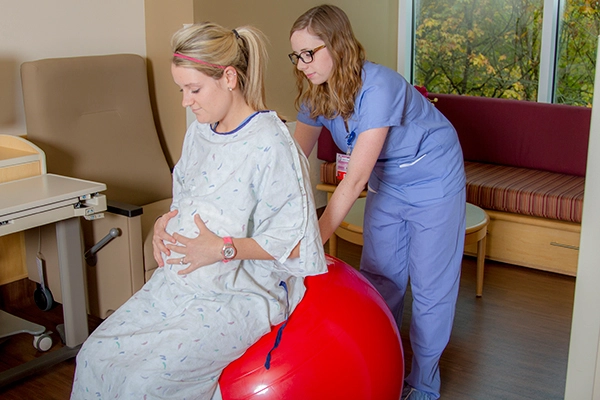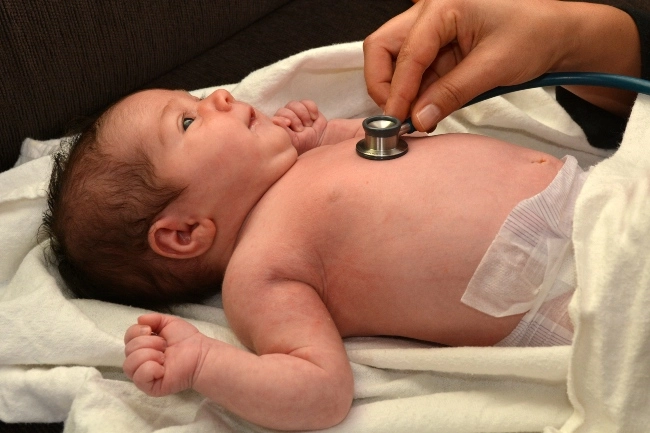Care during labor
At the Salem Health Family Birth Center, we feel it’s an absolute privilege to care for the parents and families who choose us to be part of such an exciting time in their lives. Whether this is your first baby or another happy addition to your family, we are here to make sure your baby’s birth is safe and memorable for all the right reasons.

Your family’s wishes, knowledge, values, beliefs and cultural background are incorporated into the planning and delivery of care in our birthing center. We will do our best to accommodate your birth plan. There are times when we have to make adjustments based on the clinical situation. However, staff are always ready to help you understand when and why changes need to be made if the situation calls for it.
We also care about your comfort and your personal needs. A member of our team will visit you every hour during the day and every two hours at night to check on your comfort. We are here to support you through pain management, positions, needs for personal items and bathroom needs.
Your choices for pain relief during labor and delivery
Every journey through pregnancy and childbirth is unique, just like you. When it comes to labor and delivery, several factors can influence the pain you might feel. These include:
- The size and position of your baby.
- The strength and frequency of contractions.
- The shape and size of your pelvis.
- The duration of labor.
- Your past experiences and expectations.
Exploring pain relief options
Your options for pain relief depend on whether you're having a vaginal delivery or a cesarean (C-section).
There are also some non-medical techniques that can help you along the way. Feel free to talk to your health care provider and nursing staff about all these options.

Knowledge is power
The birth of your baby is an incredibly special moment in your life, and we're here to support you every step of the way. Your preferences and medical condition are important when selecting the best pain relief plan for childbirth. We support whatever choice you make, and the more you know, the better prepared you'll be when your little one makes their debut.
We want you to be well-informed about your pain management choices before baby arrives, so please take a moment to read through this information before your due date and be sure to have a conversation with your health care provider and OB anesthesiologists about all your options.
If you decide on medical pain relief, our fantastic team of anesthesiologists is ready to help. Your comfort and safety are our top priorities and we're here to help you make the best decision for your needs.
You might want to explore different ways to manage pain during labor, including non-medical techniques like massage and relaxation. Remember, your comfort matters, so don't hesitate to ask for pain relief if you need it.
Pain relief for vaginal delivery
For vaginal delivery, there are a couple of options to help with the pain:
- IV pain medications: Your health care provider can prescribe these, and they're given through an injection into a vein. They can help dull the pain, but they might make you and your baby a bit sleepy and they might make you constipated.
- Epidural block: This is a special numbing medicine that goes into your lower back. Unlike IV meds, epidurals focus on relieving pain in the areas affected by labor. It's super effective and considered safe for both you and your baby. Many parents in the U.S. choose this option.
While most people have no problems with epidural blocks, there are some potential risks for the birthing parent. Sometimes, it might not work as planned, but we can adjust it if needed. Blood pressure could temporarily drop, but we'll keep a close eye on it. In rare cases, you might get a headache from the epidural — but don't worry, we can help with that, too.
Remember: Epidural blocks have minimal to no side effects for your baby.
Skin-to-skin bonding time
Skin-to-skin contact between a parent and their newborn provides many benefits for the health of the baby. This is the transition period after birth for you baby.
Immediately following delivery, your nurse will dry your baby and keep the baby skin-to-skin on your chest, allowing for close and tender contact with your newborn.
Contact between a parent and their newborn provides the baby with the best possible temperature regulation. Babies who get cold can have problems with breathing, feeding and maintaining proper blood sugar levels. They also cry less than those placed in a bassinet.

After birth, babies usually become quiet and alert. Yet, have the ability to look directly into their parents eyes and respond to their voices. During this quiet alert phase, your infant will make their first attempts to interact with you and the world around them.
Newborns have an extraordinary ability to respond to you. Skin-to-skin contact allows them to feel the familiar and comforting rhythm of your heartbeat. They can see the shape of your face and begin to recognize your taste and smell. They will also recognize
and respond to the soothing sound of your voice.
A parent’s gentle touch triggers physical and emotional responses. Touch also helps calm your baby and promotes their immune system.
We have Quiet Time for family bonding each day from 2 p.m. to 4 p.m. Nursing staff will still perform
required assessments during this time. To help with managing visitors, we can have one of our signs posted on your door that say, “During quiet time, visitors may be asked to return after 4 p.m. Thank you for respecting the parent's time to bond
with their baby.” Please note, you can still have visitors during this time, if you wish.
Baby screenings

After labor, the nursing staff will be closely observing you and your baby to make sure you're both doing well while in the hospital. In addition, your baby will be checked daily and may receive the following screenings and vaccines while in the hospital.
Contact your baby’s health care provider for test results. For additional information, go to the Oregon State Public Health website.
Erythromycin eye ointment
Erythromycin eye ointment is given to all newborn babies within one hour of delivery. It is the law in Oregon that babies receive an antibiotic eye ointment to prevent infections that could lead to eye damage, including blindness.
Vitamin K
Vitamin K is also given to all newborns within one hour of birth. It is the law in Oregon that babies receive this shot in order to help prevent bleeding.
Infection
Newborns are monitored throughout their entire hospital stay for any signs of infection. If needed, lab tests will be done and treatment may be given.
Hepatitis B vaccine
Your baby may receive the hepatitis B vaccination by twelve hours of age.
Glucose
All newborns are screened to determine if they need testing or treatment for blood sugar problems. If needed, this test requires a drop of blood which is usually taken from the baby’s heel.

Bilirubin
Jaundice, the yellowish-orange tint to a baby’s skin, can be a serious problem. All newborns are tested before they go home (sooner if the baby appears jaundiced).
Watch your baby’s skin color after you are home and keep your follow-up appointments. Call your provider if you have any concerns.
Newborn metabolic screen
Oregon law requires all babies be tested for rare disorders, such as phenylketonuria (PKU), cystic fibrosis, and congenital hypothyroidism, which can cause brain damage or death if not treated early.
The first test will be collected before your baby leaves the hospital and the second test will be collected before your baby is 15 days old. You will be given an envelope with the second test inside for you to take to the baby’s follow-up appointment.
Newborn hearing
All newborns are screened for hearing loss that can lead to difficulties in speech and language development and learning delays. The test is easy, painless and reliable.
Pulse oximetry
Pulse oximetry is a simple test to screen for heart defects in newborns by determining the amount of oxygen in your baby’s blood.
Checking all newborns before they are discharged from the hospital is the best way to make sure that even babies who don’t show symptoms of heart problems have been screened.
If a heart defect is identified early, your baby can receive the specialized treatment necessary to prevent death or disability.
Pictures and videos

Cameras are welcome in the Family Birth Center. However, we have a few reminders:
- Video recording or live streaming is not allowed in the birthing suite during the delivery process or in the operating room if a cesarean section is necessary.
- Families and patients are welcome to take still pictures of their own delivery experience and of their family members.
- Staff must give their permission before being photographed by family members.
Newborn photography program
This service is offered as a courtesy — you are never obligated to have your baby photographed or to place an order. Photographs are taken by First Day Photo. If you wish to have your baby photographed at Salem Health, tell your nurse and an independent photo representative will stop by your room to explain the process.